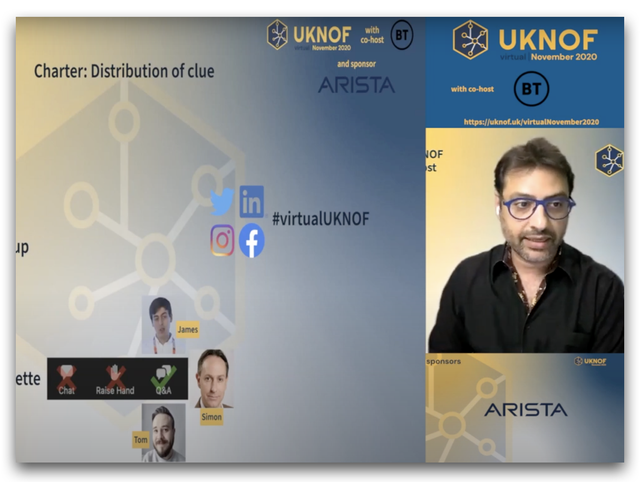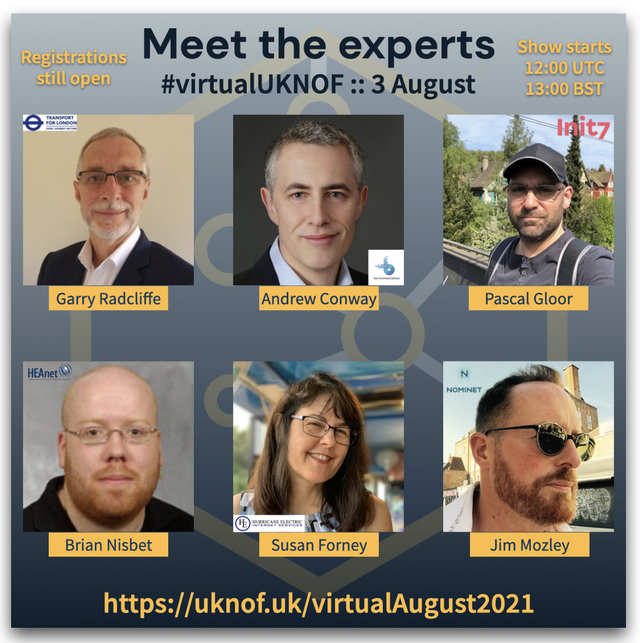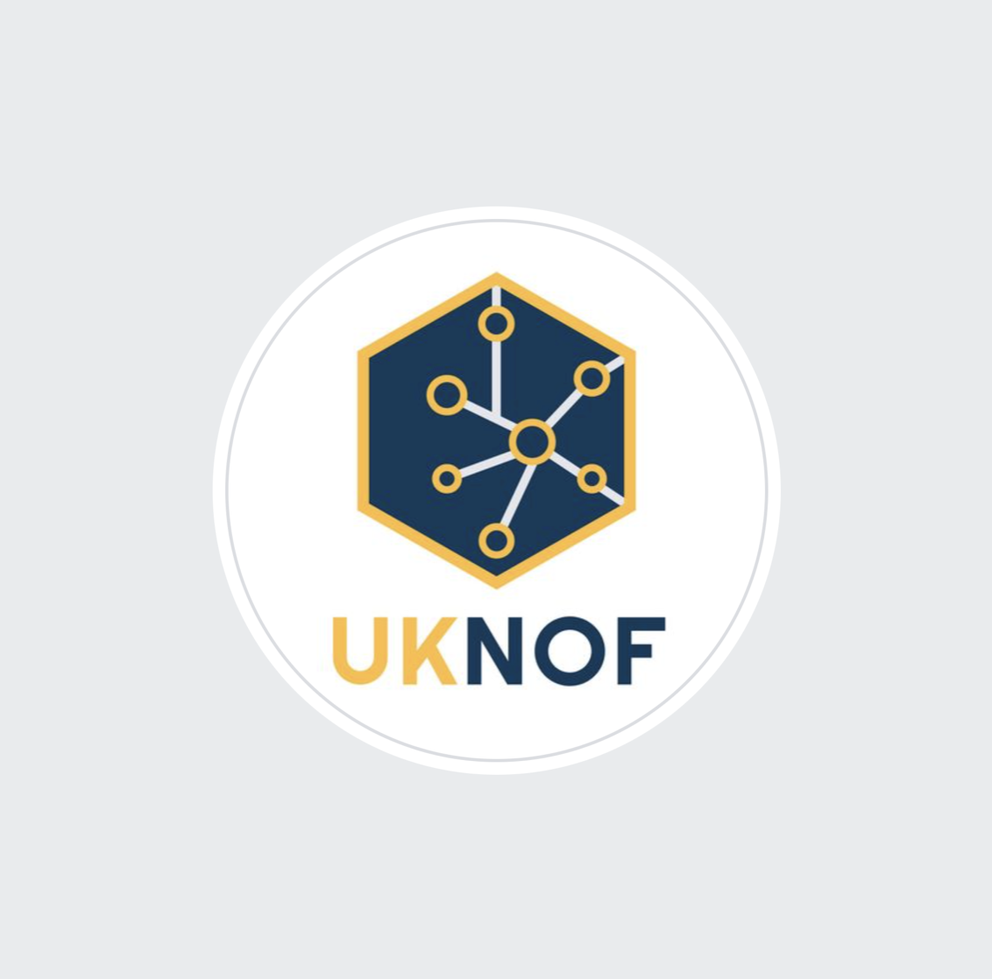Denesh Bhabuta and Leo Vegoda look back over how UKNOF’s team of volunteers transformed its events from physical meetings to online events. Read on for a useful list of lessons learned and what the authors think of as the ‘virtual event BCOP’ for other organisers.
We believe the future of events is hybrid. Our physical meetings have always been live webcast, but the last year has taught us how to draw those at home or in the office into our online events.
Before the pandemic, we normally produced three UKNOF events a year, with events located in different cities around the United Kingdom. When travel stopped, after UKNOF45 in London, January 2020, we wanted to keep the community together and collaborating. As a result, we ran four online events in 2020. VirtualUKNOF August 2021 was the third virtual event of 2021.

We didn't envisage needing to run so many online-only meetings. It was experimental to begin with and we learned something new every time. We applied each lesson learned to the next virtual event we ran. We also liaised with other event organisers within the industry and learned from their experiences as well as sharing what we learned and what worked for us.

As many companies have cancelled travel budgets and many regular participants are unable to travel and meet people, we recognise that we need to create a way for people to speak informally as well as share professional experiences in session talks. Here are some of the things the past year has taught us.
The Virtual Meeting BCOP
Having addressed the what and the why, we should look at the how.
Running a virtual event is at least as much work as running a physical event. With a physical event, the venue operator can prepare the room and provide catering. There's less technology to fail because most people are in the same room. In contrast, a virtual event has many more moving parts - communication between crew and speakers who are all remotely present needs to be managed in a different way.
What We Learned
These are some of the things we learned to make our virtual events as successful as possible.
- Timekeeping is essential: People's days are heavily scheduled. That said, it's important for the event to run to the published schedule so participants who can only attend part of the schedule can rely on the talks they plan to attend taking place at the published time. We have a timekeeper who will remind a speaker when they have five minutes left on their talk if they are overrunning. The timekeeper needs to be familiar with the speaker's material ahead of time, so they can judge if they need to interrupt the speaker and help them run to schedule.
- A technical and logistics rehearsal is important: Whatever meeting platform you use, your audience will all have different clients running on different platforms. Making sure that they all have a working client and know what the features of the platform you use are is important. This rehearsal is also an opportunity to help people who've never spoken at a virtual event know what to expect. How will they be introduced? How will questions be handled? What should they do if there is a technical glitch?
- A “run of show” script is your anchor: Sharing a detailed meeting plan with everyone involved in its operation is vital. Each person will then know what they need to do and when it should be done. Producing a virtual NOG event is very similar to producing a live, multi-segment television programme!
- Multiple voices keep people awake: It is increasingly common for people to fall asleep listening to an audiobook. No single voice, no matter how mellifluous, can keep an audience’s concentration for an extended time. We found that it’s important to have multiple voices: not just one chair to introduce speakers and manage questions from the audience. Meanwhile, live demos capture people’s attention, as do discussions, and often one question elicits others, leading to one talk showcasing multiple viewpoints.
- Keep it snappy: Concentrating on a live video, while monitoring group discussion on the UKNOF Mattermost server, and perhaps struggling with interruptions from colleagues or family is hard. It requires more concentration than being present in the room with the speaker. So it’s important to keep each session relatively short and have multiple breaks, so participants and organisers can refresh themselves or deal with urgent issues elsewhere.
- People psychology is key: Whilst virtual meetings have allowed us all to stay in touch and share knowledge during the pandemic, it became clear that the psychological consequences of spending a lot of time each day has had an adverse effect on people. The much higher cognitive load during video chats, the lower mobility when spending hours in front of a screen, higher levels of close-up eye contact has all contributed to what is now commonly known as “Zoom Fatigue”. Through live trials we settled on 3.5 hours of content spread over a total of 5 – 5½ hours per meeting day to include regular breaks. This is key for online-only and hybrid meetings.
- Communicate beyond the event: Our community uses a lot of different mechanisms to engage with each other. Like all NOGs we have a mailing list. Last year we introduced Mattermost as a way to help people make contact with each other to resolve operational issues and discuss questions at a different pace than on the list. We also use social media to reach specific audiences. We don’t just promote the event, we promote individual speakers and their talk, using groups specific to that subject. This brings in new participants and we hope will sustain UKNOF in the longer term.
What Next
As we said at the start of this blog, we believe the future is hybrid and it is a direction we are looking at moving toward over a period of time. We intend to retain the things we’ve come to appreciate about virtual events rather than going back to simply live-streaming physical events as and when they resume.
Doing this will require us to develop new processes and use new technologies. It will continue to be an interactive learning process - but one that will expand our reach by ensuring our events remain accessible to people without the travel budget or time to attend in person.
We feel it is important to point out that hybrid events are not cheap to run. Not only are (human and financial) resources required for the physical on-site component and for the online component. Resources are also required for the part which merges them so that attendees on-site and those attending remotely receive the full experience of the content of the meeting. This may be out of reach for many NOGs, especially those starting out. However we impress upon you to mainly focus on how best to share the knowledge with the resources you have and grow from that.
What have you appreciated about virtual events over the past year? Or if you have organised online events or NOG meetings, what did you learn from it? We’d be happy to hear from you in the comments below.


Comments 0
The comments section is closed for articles published more than a year ago. If you'd like to inform us of any issues, please contact us.